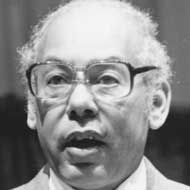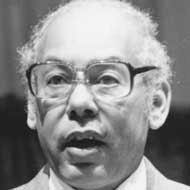William E. "Bill" Panell g51
Bill Pannell was, by consensus, the outstanding athlete on the Fort Wayne Bible campus during the pre-intercollegiate era of sports, dominating intramural play in unrivaled fashion. Today he is known internationally as an evangelist, author, evangelical theologian, social critic, and long-time professor at Fuller Theological Seminary. However, he still represents the best of an earlier era, when informal pick-up games and eagerly anticipated intramural contests, often pitting one class year against another, filled the campus hunger for athletic competition.
By the time Bill enrolled at Fort Wayne Bible Institute, vigorous physical play was a longstanding tradition on campus.
Safara Witmer, later president of FWBC and architect of the movement for Bible college accreditation, roomed with Silvan Hausser, later a career missionary to Venezuela and Ecuador, both from the class of 1922. One day they were playing on opposing teams on an outdoor court at Fort Wayne Bible Training School. Silvan, a rough-hewn street player, grabbed Safara to restrict his moves, provoking a vigorous protest from his irate roommate, who was already a master of logical argument and practical ethics. Paul Erdel, former campus ping pong champion, notes we learn three things from this anecdote: 1) Basketball was alive and well on campus by 1922, 2) Hoosier hysteria has always been a passionate sport, and 3) Even Missionary Church heroes sometimes let their halos slip.
During World War II, some male students at Fort Wayne Bible Institute formed a team and played other club teams in the area, in part of Christian witness through good sportsmanship and friendly conversation. Then, early in the 1947-48 school year, students petitioned for a formal intramural program. There was quite a number of fine athletes on campus, but the best was a new freshman from Sturgis, MI., Bill Pannell.
Bill had earned letters in all three sports that were available then at Sturgis High School: football, basketball, and baseball. The school had won a class B state championship in basketball his sophomore year, though Bill did not play on that squad. By his senior year, however, he was the leading scorer and a first team all-conference player.
Bill’s superb high school record might have led to an athletic scholarship at a state school, but he chose instead to prepare for ministry at Fort Wayne Bible Institute. God sealed his choice when an amazing housemaid named Mildred Bedford gave Bill $500, which covered his first year’s expenses and more. Bill had previously attended a Plymouth Brethren Sunday School and surrendered his life to Jesus Christ at First Missionary Church in Sturgis during his junior year in high school. Chris J. Gerig g23 was the evangelist who led Bill to Christ.
By his sophomore year, Bill was hired as a student instructor in physical education at FWBI, but his talents extended far beyond athletics, and he left his mark in several areas. He helped lead the Mission Band, joined the “League of Nations” gospel team, spoke on the Sunrise Chapel radio program, and edited the Light Tower. He graduated in 1951 with other well-known FWBC* classmates as Gerald Gerig, Wesley Gerig, Zenas Gerig, and Edison Reynolds. *Name changed to Fort Wayne Bible College.
Bill’s evangelistic gifts were immediately evident, and he began a nation-wide ministry of song-leading, preaching, and teaching upon graduation. Other major commitments included pastoral ministry in Detroit (1955-65), Youth for Christ (1964-68), and associate evangelist and vice president for the Tom Skinner Association (1968-74).
Bill also continued his education at the University of Southern California, where he earned an M.A. in Social Ethics. He would subsequently be granted honorary doctorates from Malone College, Geneva College, and Taylor University.
Bill’s global impact may have come through his powerful writings, beginning with his classic analysis of evangelical race relations, My Friend, the Enemy (Word 1968), followed by Evangelism from the Bottom Up (Zondervan 1992) and The Coming Race Wars? A Cry for Reconciliation (Zondervan 1993). These books led to numerous guest lectureships in colleges and universities, and major roles in conferences throughout the world.
Bill was the first African American to serve on the Board of Trustees of Fuller Theological Seminary (1971-74), from which he eventually resigned to join the faculty there. At Fuller he begin with an appointment to teach evangelism, also supervising the Black Pastors’ Program (to be rechristened the William E. Pannell Center for African American Studies). In 1992 he was named the Arthur DeKruyter/Christ Church Oakbrook Professor of Preaching, which post he held until 2000. During most of that period he was concurrently Dean of the Chapel (1992-1998). Today he is a Special Assistant to the President and Senior Professor of Preaching, soon to be Professor Emeritus of Preaching. Other honors at Fuller included the C. Davis Weyerhaeuser Award for Excellence in 1993.
Bill has also served on the boards of Youth for Christ USA, which he chaired in 1980; the Academy of Evangelism, where he was president from 1983 to 1984; Taylor University; and Sojourners/Call to Renewal.
Bill and his wife Hazel life in Altadena, CA. They have two grown sons, Philip and Peter.
Intramural teammates, opponents, and fans, who were dazzled by Bill’s athleticism on the short gym in Founders Hall or by the way he could hit a softball on what became the “South campus,” could scarcely have imagined the national arenas or global audiences Bill would have someday.



